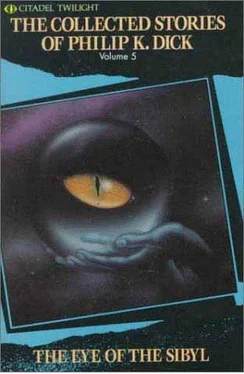“Strange,” Milt murmured, “that my wug-plant isn’t thriving. I’d have thought in such a moist atmosphere…”
“It’s the gravity,” Mary said, eyes still shut, her bosom rising and falling regularly. She was almost asleep. “Too much for it.”
Milt regarded the supine form of the woman, remembering Pumpkin under similar circumstances. The hypnogogic moment, between waking and sleeping, when consciousness and unconsciousness became blended… reaching, he picked up a pebble.
He tossed the pebble into the leaves near Mary’s head.
At once she sat up, eyes open startled, her sunsuit falling from her.
Both her ears pricked up.
“But we Terrans,” Milt said, “have lost control of the musculature of our ears, Mary. On even a reflex basis.”
“What?” she murmured, blinking in confusion as she retied her sunsuit.
“Our ability to prick up our ears has atrophied,” Milt explained. “Unlike the dog and cat. Although to examine us morphologically you wouldn’t know because the muscles are still there. So you made an error.”
“I don’t know what you’re talking about,” Mary said, with a trace of sullenness. She turned her attention entirely to arranging the bra of her sunsuit, ignoring him.
“Let’s go back to the conapt,” Milt said, rising to his feet. He no longer felt like lolling in the park, because he could no longer believe in the park. Unreal squirrel, unreal grass… was it actually? Would they ever show him the substance beneath the illusion? He doubted it.
The squirrel followed them a short way as they walked to their parked ‘copter, then turned its attention to a family of Terrans which included two small boys; the children threw nuts to the squirrel and it scampered in vigorous activity.
“Convincing,” Milt said. And it really was.
Mary said, “Too bad you couldn’t have seen Dr. DeWinter more, Milt. He could have helped you.” Her voice was oddly hard.
“I have no doubt of that,” Milt Biskle agreed as they re-entered the parked ‘copter.
When they arrived back at Mary’s conapt he found his Martian wug-plant dead. It had evidently perished of dehydration.
“Don’t try to explain this,” he said to Mary as the two of them stood gazing down at the parched, dead stalks of the once active plant. “You know what it shows. Terra is supposedly more humid than Mars, even reconstructed Mars at its best. Yet this plant has completely dried out. There’s no moisture left on Terra because I suppose the Prox blasts emptied the seas. Right?”
Mary said nothing.
“What I don’t understand,” Milt said, “is why it’s worth it to you people to keep the illusion going. I’ve finished my job .”
After a pause Mary said, “Maybe there’re more planets requiring reconstruct work, Milt.”
“Your population is that great?”
“I was thinking of Terra. Here,” Mary said. “Reconstruct work on it will take generations; all the talent and ability you reconstruct engineers possess will be required.” She added, “I’m just following your hypothetical logic, of course.”
“So Terra’s our next job. That’s why you let me come here. In fact I’m going to stay here.” He realized that, thoroughly and utterly, in a flash of insight. “I won’t be going back to Mars and I won’t see Fay again. You’re replacing her.” It all made sense.
“Well,” Mary said, with a faint wry smile, “let’s say I’m attempting to.” She stroked his arm. Barefoot, still in her sunsuit, she moved slowly closer and closer to him.
Frightened, he backed away from her. Picking up the dead wug-plant he numbly carried it to the apt’s disposal chute and dropped the brittle, dry remains in. They vanished at once.
“And now,” Mary said busily, “we’re going to visit the Museum of Modern Art in New York and then, if we have time, the Smithsonian in Washington, D.C. They’ve asked me to keep you busy so you don’t start brooding.”
“But I am brooding,” Milt said as he watched her change from her sunsuit to a gray wool knit dress. Nothing can stop that, he said to himself. And you know it now. And as each reconstruct engineer finishes his area it’s going to happen again. I’m just the first.
At least I’m not alone, he realized. And felt somewhat better.
“How do I look?” Mary asked as she put on lipstick before the bedroom mirror.
“Fine,” he said listlessly, and wondered if Mary would meet each reconstruct engineer in turn, become the mistress of each. Not only is she not what she seems, he thought, but I don’t even get to keep her.
It seemed a gratuitous loss, easily avoided.
He was, he realized, beginning to like her. Mary was alive ; that much was real. Terran or not. At least they had not lost the war to shadows; they had lost to authentic living organisms. He felt somewhat cheered.
“Ready for the Museum of Modern Art?” Mary said briskly, with a smile.
Later, at the Smithsonian, after he had viewed the Spirit of St. Louis and the Wright brothers’ incredibly ancient plane—it appeared to be at least a million years old—he caught sight of an exhibit which he had been anticipating.
Saying nothing to Mary—she was absorbed in studying a case of semiprecious stones in their natural uncut state—he slipped off and, a moment later, stood before a glass-walled section entitled
PROX MILITARY OF 2014
Three Prox soldiers stood frozen, their dark muzzles stained and grimy, side arms ready, in a makeshift shelter composed of the remains of one of their transports. A bloody Prox flag hung drably. This was a defeated enclave of the enemy; these three creatures were about to surrender or be killed.
A group of Terran visitors stood before the exhibit, gawking. Milt Biskle said to the man nearest him, “Convincing, isn’t it?”
“Sure is,” the man, middle-aged, with glasses and gray hair, agreed. “Were you in the war?” he asked Milt, glancing at him.
“I’m in reconstruct,” Milt said. “Yellow Engineer.”
“Oh.” The man nodded, impressed. “Boy, these Proxmen look scary. You’d almost expect them to step out of that exhibit and fight us to the death.” He grinned. “They put up a good fight before they gave in, those Proxmen; you have to give ‘em credit for that.”
Beside him the man’s gray, taut wife said, “Those guns of theirs make me shiver. It’s too realistic.” Disapproving, she walked on.
“You’re right,” Milt Biskle said. “They do look frighteningly real, because of course they are.” There was no point in creating an illusion of this sort because the genuine thing lay immediately at hand, readily available. Milt swung himself under the guard rail, reached the transparent glass of the exhibit, raised his foot and smashed the glass; it burst and rained down with a furious racket of shivering fragments.
As Mary came running, Milt snatched a rifle from one of the frozen Proxmen in the exhibit and turned it toward her.
She halted, breathing rapidly, eyeing him but saying nothing.
“I am willing to work for you,” Milt said to her, holding the rifle expertly. “After all, if my own race no longer exists I can hardly reconstruct a colony world for them; even I can see that. But I want to know the truth. Show it to me and I’ll go on with my job.”
Mary said, “No, Milt, if you knew the truth you wouldn’t go on. You’d turn that gun on yourself.” She sounded calm, even compassionate, but her eyes were bright and enlarged, wary.
“Then I’ll kill you,” he said. And, after that, himself.
“Wait.” She pondered. “Milt—this is difficult. You know absolutely nothing and yet look how miserable you are. How do you expect to feel when you can see your planet as it is? It’s almost too much for me and I’m—” She hesitated.
Читать дальше









